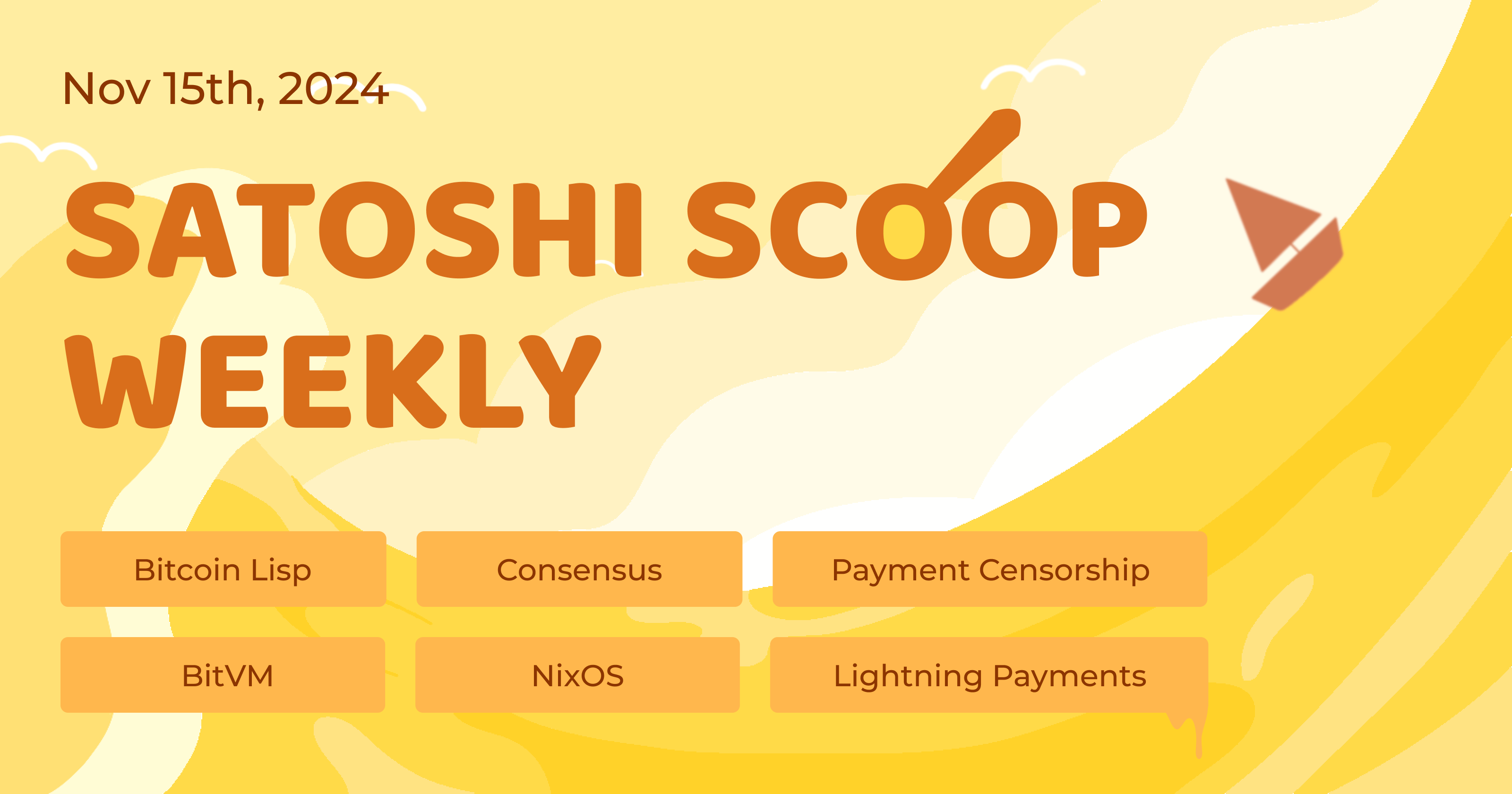Satoshi Scoop Weekly, 15 Nov 2024
 Cryptape
CryptapeTable of contents
- Crypto Insights
- A Lisp for Bitcoin, More Powerful Than Script?
- On Ossification in Bitcoin Protocol
- An Open-Source Bitcoin Consensus Analysis Project
- OPR Protocol: A Fast, Scalable Protocol for Resolving Lightning Payments
- Nix-Bitcoin: Securing and Simplifying Bitcoin Node Management with NixOS
- How the Lightning Network Quietly Taking Over Bitcoin Network?
- Post-Election Crypto Golden Age in the U.S.: Policy Shifts and Market Opportunities
- Bitcoin’s Role in Promoting Global Stability and Peace
- U.S. Government Encourages Shift from C and C++ to Safer Programming Languages
- Rusty Russell’s Great Script Revival Plan Talk
- Top Reads on Blockchain and Beyond

Crypto Insights
A Lisp for Bitcoin, More Powerful Than Script?
The author has been long exploring a form of Lisp as an alternative to Bitcoin Script, previously proposing BTCLisp. Building on that, the author introduces BLL (a Basic Lisp Language), a debuggable Lisp script designed for integration with Bitcoin's consensus, making it more programmer-friendly. Unlike BTCLisp, BLL is not lazily evaluated, meaning all parameters to an operation are evaluated unless the script aborts.
More about BLL:https://delvingbitcoin.org/t/debuggable-lisp-scripts/1224
On Ossification in Bitcoin Protocol
The author discusses the phenomenon of protocol ossification, urging measured, consensus-driven upgrades to ensure Bitcoin remains dynamic and secure.
An Open-Source Bitcoin Consensus Analysis Project
This project categorizes the following six Bitcoin stakeholder groups:
Full node operators (e.g., exchanges, payment processors, custodians)
Investors (e.g., large individual Bitcoin holders, institutional fund holders, central banks, governments)
Media (e.g., media organizations, social media influencers, Bitcoin event organizers)
Miners (e.g., individual miners, large-scale mining operations, mining pools, chip manufacturers)
Protocol developers (e.g., core developers)
Users and application developers (those who actively use bitcoin for various purposes, e.g., developers and users of payment solutions like Lightning, Bitcoin-based NFTs and fungible token users and developers, teams working on Layer 2s, on-chain wallet providers)
Each group has unique motivations, influence, and incentives that guide their actions. Their relative power can shift depending on their role in network operations and at various stages of consensus changes. Notably, while Bitcoin Core maintainers don’t have excessive power to change Bitcoin, they have significant power to veto changes.
The analysis introduces an additional dimension: the "State of Mind" of participants, describing six levels of engagement from strongly supporting to strongly opposing consensus changes, which affect their willingness to allocate resources to support or oppose changes.
Visit the project’s GitHub page for more details.
OPR Protocol: A Fast, Scalable Protocol for Resolving Lightning Payments
To address the scaling issues of Lightning payments, especially when the incremental cost of resolving a payment on-chain exceeds the value of the payment, the author proposes the Off-chain Payment Resolution (OPR) protocol, which has the following features:
Payments can be correctly resolved as long as both parties are self-interested and able to implement the protocol, regardless of how small the payment is.
All payments are resolved in seconds instead of hours.
No party ever needs on-chain settlement to resolve a payment.
Casual users can send and receive payments without a watchtower or high availability.
OPR protocol appears to be well-suited to small, everyday Lightning payments, and also can be used for large payments, either directly or by dividing the large payment into many smaller ones.
Full details and technical background of the protocol: read the full post.
Nix-Bitcoin: Securing and Simplifying Bitcoin Node Management with NixOS
Nix-bitcoin includes a collection of Nix packages and NixOS modules, with a focus on security, simplifying the deployment and management of Bitcoin nodes securely. Developer João Thallis presented nix-bitcoin at NixCon2024.
How the Lightning Network Quietly Taking Over Bitcoin Network?
Over the last three years—especially through 2024—the Lightning Network has seen substantial growth, with steady increases in TVL (total value locked), active nodes, monthly/daily transactions, transaction volume, and active users.
The Lightning Network’s organic growth evolves around a clear use case for payments, without relying on additional tokens and incentivize programs. Its economic model is solid, with clear benefits for all participants. This silent but steady expansion shows Lightning's role as a genuinely useful and effective solution for Bitcoin payments.
Post-Election Crypto Golden Age in the U.S.: Policy Shifts and Market Opportunities
With Trump’s victory and Republican control of Congress, significant crypto policy shifts may emerge, including:
A friendlier regulatory environment, potentially replacing SEC head Gary Gensler and reducing regulatory risk.
Congress’s support for innovation could open channels for project funding and institutional capital.
The U.S. might establish a Bitcoin strategic reserve, cementing its role in global crypto finance.
Bitcoin’s Role in Promoting Global Stability and Peace
Bitcoin's transformative potential extends beyond being a digital currency. By empowering individuals economically and promoting financial inclusion and transparency, Bitcoin offers a unique opportunity to build a more stable and peaceful world.
U.S. Government Encourages Shift from C and C++ to Safer Programming Languages
In a report titled Product Security Bad Practices, the U.S. Cybersecurity and Infrastructure Security Agency (CISA) advises developers against using memory-unsafe languages like C or C++ for critical infrastructure projects. Instead, they recommend memory-safe languages such as Rust, Java, C#, Go, Python, and Swift. The report, however, has sparked debate around issues like performance loss and the challenges of converting legacy codebases.
Rusty Russell’s Great Script Revival Plan Talk
In this talk, Rusty Russell proposes a coherent model for enhancing Bitcoin Script capabilities while avoiding the pitfalls which originally caused it to be hobbled.
Top Reads on Blockchain and Beyond
Lightning Network Payment Censorship Despite Encrypted Communication
Researcher Charmaine Ndolo (personal website) highlights privacy risks in the Lightning Network (LN), beyond the long known application-level centralization.
Her paper Payment Censorship in the Lightning Network Despite Encrypted Communication explores the LN’s susceptibility to censorship by a network-level actor such as a malicious autonomous system, revealing that a network-level actor can identify and censor all payments routed via their network by just examining the packet headers.
The research indicates that LN messages can be identified even with end-to-end encryption. Using timing, direction of flow and message type, a network-level observer can determine a node’s role in a payment path. Simulations of the attack on the Lightning mainnet suggest that such attacks could have mild to severe impacts, depending on the attacker and payment types affected. The research recommends countermeasures for enhanced privacy, including fixed message sizes and dummy traffic.
Push-Button Verification for BitVM Implementations
To address limitations in Bitcoin’s non-Turing-complete script language, a team led by Nubit (@nubit_org) developed Push-Button Verification, the first formal verification tool for BitVM implementations. This tool employs a register-based, high-level domain-specific language (DSL) that abstracts away complex stack operations, facilitating verification of program correctness while preserving Bitcoin Script semantics. Evaluated on 98 benchmarks from BitVM’s SNARK verifier, this tool successfully verifies 94% of cases within seconds, demonstrating its effectiveness in enhancing the security and reliability of BitVM.
Full paper: Push-Button Verification for BitVM Implementations
Subscribe to my newsletter
Read articles from Cryptape directly inside your inbox. Subscribe to the newsletter, and don't miss out.
Written by
